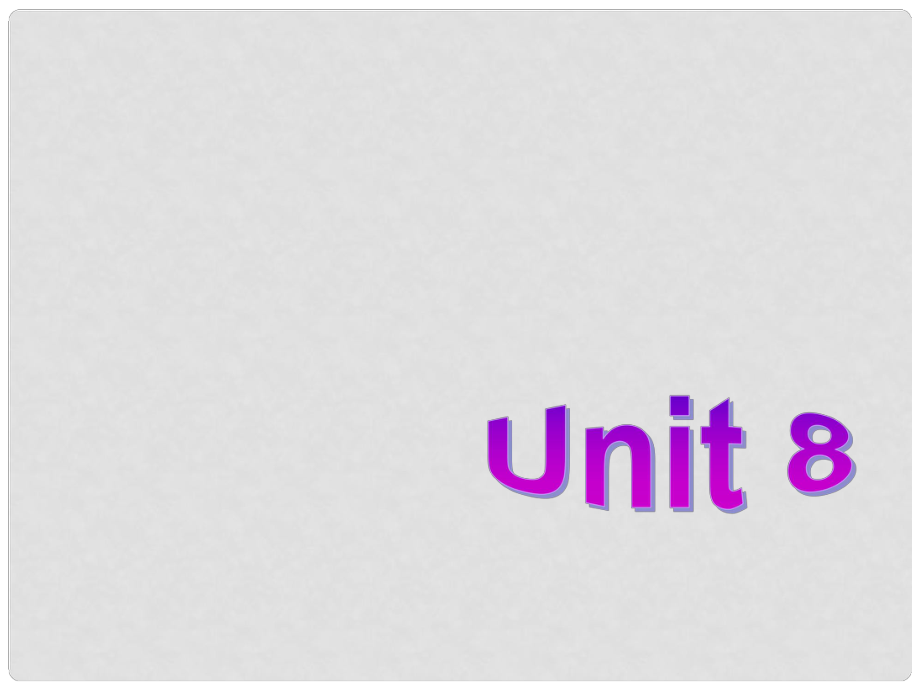《浙江省紹興縣楊汛橋鎮(zhèn)中學(xué)九年級(jí)英語(yǔ)全冊(cè) Unit 8 It must belong to Carla Section A 2課件 (新版)人教新目標(biāo)版》由會(huì)員分享��,可在線(xiàn)閱讀,更多相關(guān)《浙江省紹興縣楊汛橋鎮(zhèn)中學(xué)九年級(jí)英語(yǔ)全冊(cè) Unit 8 It must belong to Carla Section A 2課件 (新版)人教新目標(biāo)版(22頁(yè)珍藏版)》請(qǐng)?jiān)谘b配圖網(wǎng)上搜索�。
1、屬于屬于流行音樂(lè)流行音樂(lè)最喜歡的作家最喜歡的作家玩具卡車(chē)玩具卡車(chē)Check the phrases.belong topop musicfavourite writertoy truck發(fā)帶發(fā)帶參加參加一些寶貴的東西一些寶貴的東西揀起揀起被偷被偷hair bandattend/join/take part insomething valuablepick upbe stolenDo you hear strange noises outside our window?Yes, something unusual is happening in our town.n. 聲音���;噪音聲音����;噪音n.
2�����、事件�����;事件���; 意外事件意外事件My father called the policeman, but he couldnt find anything strange.n. 男警察男警察 (pl. policemen; policewoman 女警察女警察)Maybe it was a wolf, everyone in our town is feeling uneasy.n. 狼狼adj. 擔(dān)心的�����;擔(dān)心的�;不安的不安的3aRead the article and decide which might be the best title.A. A Small and Quiet TownB.
3��、 Strange Happenings in My TownC. Animals in Our Neighborhood3bRead the article again and find words to match the meanings.nervous or worried _young people _person in the next house _area where people live _animal like a very large dog _person who makes noise _uneasyteenagersneighborneighborhoodwolfn
4、oise-maker3cRead the article carefully and write what people think about the strange noises.Who gave opinions?What are the opinions?Victors wifeShe thinks that it could be an animal.Victor and his friendsThey think it must be teenagers having fun.The policemenHelenOne woman in the areaThe writer him
5��、selfThey think it might be the wind.She thought it was too big to be a dog. She thought that maybe it was a bear or a wolf.She guesses it cant be a dog.He thinks the noise-maker is having too much fun creating fear in the neighborhood.1. It used to be very quiet.used to do sth. 曾經(jīng)���,過(guò)去常常曾經(jīng),過(guò)去常常 (現(xiàn)在不做了
6�����、)(現(xiàn)在不做了)be used to do sth. (=be used for doing sth.) 被用來(lái)做被用來(lái)做be used to doing sth. 習(xí)慣于做習(xí)慣于做 e.g. I used to study in this school. 我曾經(jīng)在這個(gè)學(xué)校學(xué)習(xí)�����。我曾經(jīng)在這個(gè)學(xué)校學(xué)習(xí)����。 Our parents are used to living in the village. 我們的父母習(xí)慣了居住在山村。我們的父母習(xí)慣了居住在山村�。 This box is used for storing toys. = This box is used to store toys. 這個(gè)箱
7、子是被用來(lái)儲(chǔ)存玩具的��。這個(gè)箱子是被用來(lái)儲(chǔ)存玩具的�����。2. However, these days, something unusual is happening in our town.構(gòu)成:不定代詞構(gòu)成:不定代詞+形容詞形容詞(定語(yǔ)后置)(定語(yǔ)后置) e.g. something important 一些重要的事情一些重要的事情 something interesting 一些有趣的事一些有趣的事un- 表示否定表示否定usual 通常的通常的 unusual 不平常的不平常的happy快樂(lè)的快樂(lè)的unhappy不快樂(lè)不快樂(lè)的的lucky幸運(yùn)的幸運(yùn)的unlucky不幸的不幸的friendly友
8、好的友好的unfriendly不友好不友好的的easy輕松的輕松的uneasy不安的不安的反義反義3. Victor, a teacher at my school, is really nervous.a teacher at my school 在句中作同在句中作同位語(yǔ)����。它指的是位語(yǔ)。它指的是Victor ���。e.g. My sister, Helen, will have a picnic with me. 我的姐姐海倫將和我一起野餐��。我的姐姐海倫將和我一起野餐���。4.but I couldnt see a dog or anything else, either. too “也也” 肯定句
9、����。句末?��?隙ň?。句末����。also “也也”肯定句。句中,肯定句���。句中��, be后面����,行為動(dòng)詞前�。后面,行為動(dòng)詞前��。either “也也”否定句��。句末���。否定句。句末��。e.g. She is a singer, too. 她也是個(gè)歌手��。她也是個(gè)歌手����。 He can also sing the English song. 他也可以唱英文歌。他也可以唱英文歌。 If you dont go to the park, he wont go there, either. 如果你不去公園��,他也不去�����。如果你不去公園����,他也不去。5. One woman in the area saw something runni
10�����、ng away.see sb. doing sth. 看見(jiàn)某人正在做某事看見(jiàn)某人正在做某事 (強(qiáng)調(diào)動(dòng)作正在發(fā)生)(強(qiáng)調(diào)動(dòng)作正在發(fā)生)see sb. do sth. 看見(jiàn)某人做某事看見(jiàn)某人做某事 (強(qiáng)調(diào)發(fā)生的整個(gè)過(guò)程)(強(qiáng)調(diào)發(fā)生的整個(gè)過(guò)程)類(lèi)似短語(yǔ):類(lèi)似短語(yǔ):一感一感 feel 二聽(tīng)二聽(tīng) listen to, hear三看三看 watch, notice, seee.g. I see mom cooking in the kitchen. 我看見(jiàn)媽媽正在廚房做飯���。我看見(jiàn)媽媽正在廚房做飯��。 Lucy said she saw me do the housework. 露西說(shuō)她看見(jiàn)我做家務(wù)了��。露西說(shuō)
11�、她看見(jiàn)我做家務(wù)了����。6. The noise-maker is having too much fun creating fear in the neighborhood.have fun doing sth. 做某事玩得愉快。做某事玩得愉快。=have a good time doing sth.=enjoy doing sth.e.g. I have fun flying kites. 我享受放風(fēng)箏的樂(lè)趣���。我享受放風(fēng)箏的樂(lè)趣�����。1. Make sentences with these words. used to, have no idea, too. to. , see sb. do sth., see sb. doing sth.2. Review the article.
 浙江省紹興縣楊汛橋鎮(zhèn)中學(xué)九年級(jí)英語(yǔ)全冊(cè) Unit 8 It must belong to Carla Section A 2課件 (新版)人教新目標(biāo)版
浙江省紹興縣楊汛橋鎮(zhèn)中學(xué)九年級(jí)英語(yǔ)全冊(cè) Unit 8 It must belong to Carla Section A 2課件 (新版)人教新目標(biāo)版

